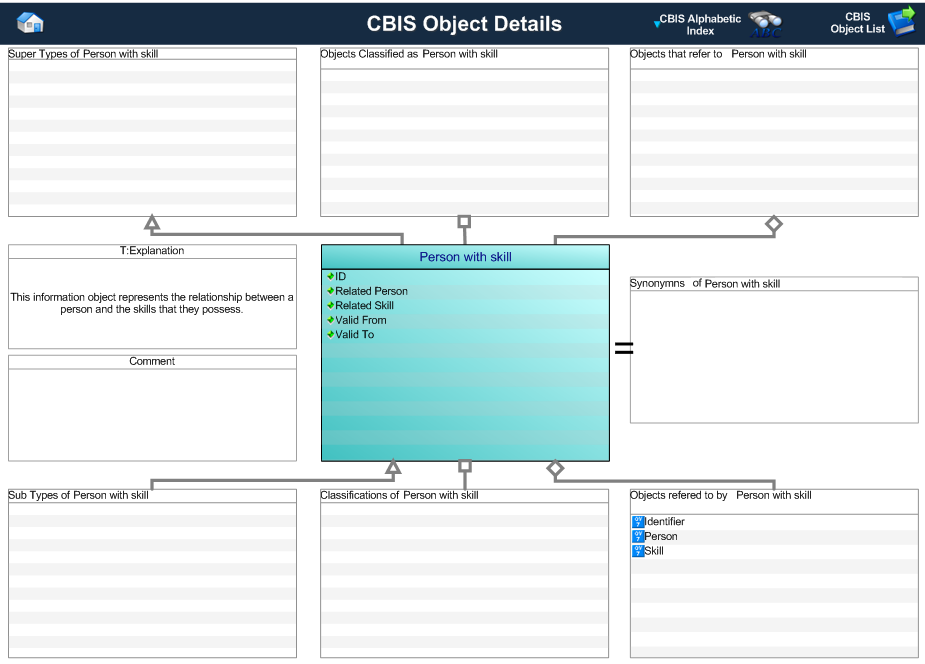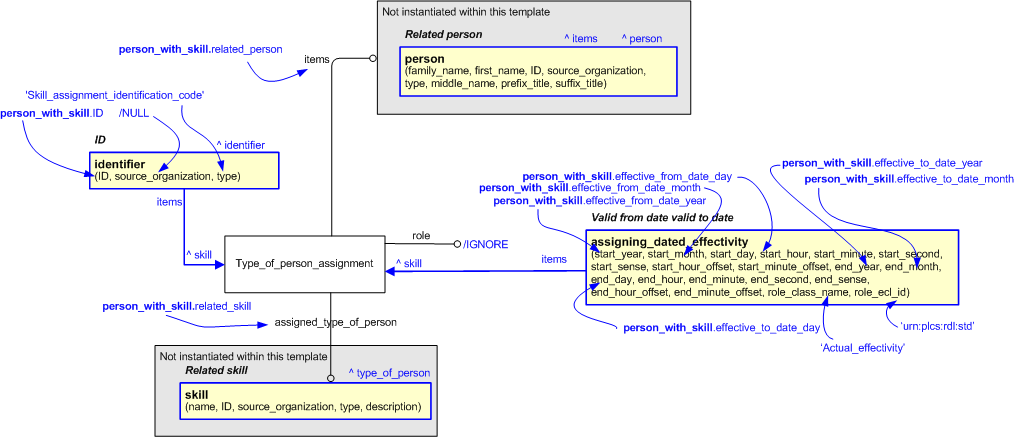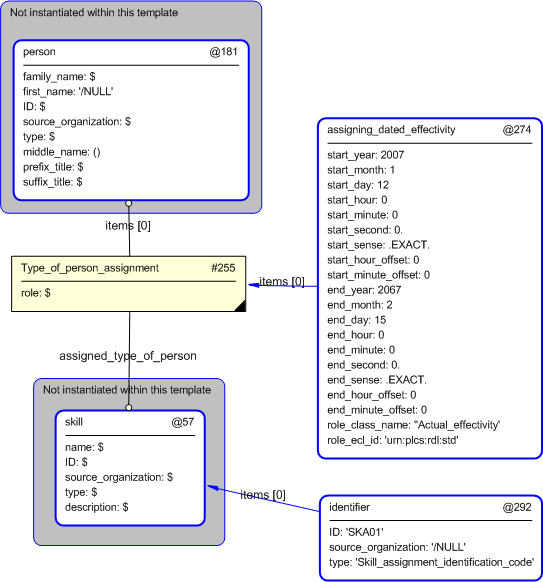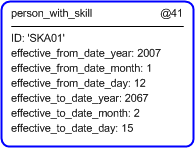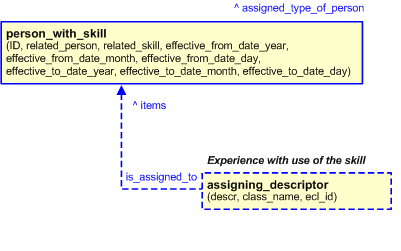Template:— person_with_skill (prsnskl)
Context:— UK_Defence |
Date: 2009/05/11 23:51:22
Revision: 1.3
|
This section specifies the template person_with_skill.
NOTE
The template has been defined in the context of
UK_Defence.
Refer to the business context for details of related templates.
NOTE
An explanation of a template and the associated instantiation path is
provided in the
Template overview
section.
This template describes how to represent the UK_Defence concept of a person with skill in terms of PLCS
model elements (templates, entities, and reference data).
This information object is used to represent the skills of a type of person that may be used as a resource when allocated
to other business objects such as a Maintenance Activity.
The definition of the person with skill object is: This information object represents the relationship between a person and
the skill that is possessed by that person.
Figure 1 — Graphical Representation for Business Object Document
|
Attribute name
|
Attribute description
|
Attribute type
|
Optionality
|
| ID |
The ID for the person with skill relationship.
|
Identifier |
Mandatory |
| Related Person |
This is the reference to the person that possesses the related skill. |
Object reference, person |
Mandatory |
| Related Skill |
This is the reference to the skill that is possessed by the related person. |
Object reference, skill |
Mandatory |
| Valid From |
This is the date from which the related person possessed the related skill. |
Intrinsic |
Optional |
| Valid To |
This is the date to which the related person possessed the related skill. |
Intrinsic |
Optional |
Table 1 — Person with skill, attribute details
The EXPRESS-G diagram in
Figure
2
shows the templates and EXPRESS entities that are required
to represent the template
"person_with_skill".
The text highlighted in blue shows the template parameters.
Figure 2 — An EXPRESS-G representation of the Information model for person_with_skill
The graphic for the template to be used in other EXPRESS-G diagrams
is shown in Figure
3
below.
Figure 3 — The graphical representation of the person_with_skill template
The following input parameters are defined for this template:
The identifier for the person with skill relationship.
The identifier of the related_person identifying with the the skill.
The identifier of the skill assigned to the person.
The year of the valid from, use date, of the plan.
The month of the valid from, use date, of the plan.
The day of the valid from, use date, of the plan.
The year of the valid to, use date, of the plan.
The month of the valid to, use date, of the plan.
The day of the valid to, use date, of the plan.
The following reference parameters are defined for this template:
%^target = $person_with_skill.assigned_type_of_person%
The skill reference assigned to the person.
%^target = $person_with_skill.items%
The person-reference having the skill assigned.
Assigning an identification to the relationship.
The instantiation path shown below specifies the entities that are to be
instantiated by the template.
A description of templates and the syntax for the instantiation path is
provided in the
Templates Help/Information section.
Type_of_person_assignment-- The Type_of_person_assignment entity is -- referable when this template is used by binding it to the reference -- parameters %^skill =
Type_of_person_assignment%
Type_of_person_assignment.assigned_type_of_person ->
@related_skillType_of_person_assignment.role = '/IGNORE'
Type_of_person_assignment.items ->
@related_person-- id -- source_organization set to /NULL as per Identifier template characterizations when Person is the source; . /
identifier(
ID=@ID,
source_organization=/NULL,
type='Skill_assignment_identification_code',
items=^skill)/
-- effective from date /
assigning_dated_effectivity(
items=^skill,
start_year=@effective_from_date_year,
start_month=@effective_from_date_month,
start_day=@effective_from_date_day,
start_hour=0,
start_minute=0,
start_second=0,
start_sense=.EXACT.,
start_hour_offset=0,
start_minute_offset=0,
end_year=@effective_to_date_year,
end_month=@effective_to_date_month,
end_day=@effective_to_date_day,
end_hour=0,
end_minute=0,
end_second=0,
end_sense=.EXACT.,
end_hour_offset=0,
end_minute_offset=0,
role_class_name='Actual_effectivity',
role_ecl_id='urn:plcs:rdl:std')/
The following entities are instantiated with attributes as specified:
The instance diagram in Figure
4
shows an example of the EXPRESS entities and templates that are instantiated by the template:
/person_with_skill(ID='SKA01', effective_to_date_year='2067', effective_to_date_month='2', effective_to_date_day='15', effective_from_date_year='2007', effective_from_date_month='1', effective_from_date_day='12')/
(an illustration of the consolidated person_with_skill template is shown in
Figure
5 below.)
Figure 4 — Entities instantiated by person_with_skill template
The instance diagram in
Figure
5
shows the graphic symbol for the template that is to be
used in other instance diagrams. The example template is:
/person_with_skill(ID='SKA01', effective_to_date_year='2067', effective_to_date_month='2', effective_to_date_day='15', effective_from_date_year='2007', effective_from_date_month='1', effective_from_date_day='12')/
Figure 5 — Instantiation of person_with_skill template
The following section details how the
person_with_skill
template can be optionally characterized by assigning
other constructs to it. These are characterizations commonly
applied to the template. The ISO 10303-239 EXPRESS model may enable
other assignments to the entities instantiated by the template.
The EXPRESS-G diagram in Figure
6
shows the possible characterizations of the template
"person_with_skill".
Figure 6 — Characterizations for person_with_skill
The following characterizations may apply:
Characterization Experience with use of the skill
NOTE this characterization is optional.
The experience of use of the skill that the person possesses can be represented using instances
of the template assigning_descriptor.
These are applied to the ^skill reference parameter. See Figure 6 for the an abstract view of this.
The following template call shows how this might be instantiated with respect to Figure 2.
/assigning_descriptor(descr='The skill has only been used by this person on type 23 vessels and it may not be applicable elsewhere.', class_name='Experience', ecl_id='urn:plcs:rdl:uk_defence', is_assigned_to='#146')/
